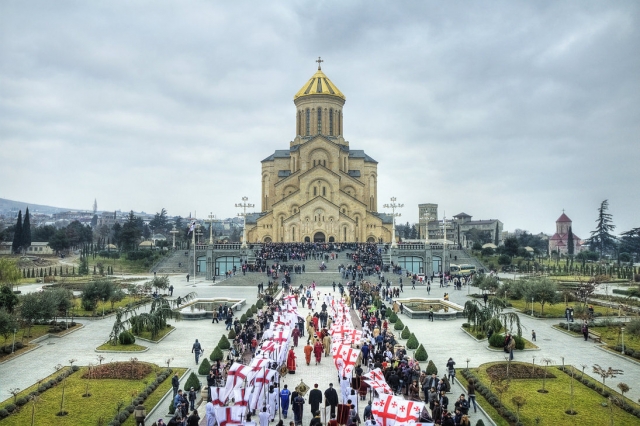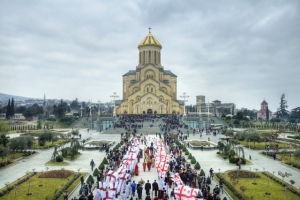How Can We Constructively Engage the Church in Democratization?
While Georgia aspires to join the European Union, powerful players in the country can both hamper and speed-up the necessary democratization process. The Georgian Orthodox Church (GOC), repeatedly named as the most trusted institution in the country, follows an ideology which ostensibly contradicts, rather than encourages, liberal democracy principles.
However, rather than pushing the Church out of the democratization narrative, the Georgian Institute of Politics wondered what measures we should consider to positively engage the Georgian Orthodox Church in the democratization process. With its apparent high level of authority and strong position in Georgian society, the church could be a powerful ally to drive change.
Within Georgia’s fragile division of church and state, the role of the influential Georgian Orthodox Church becomes all the more important for the country’s democratization process. The GOC is capable of not only spreading its position in various areas of society, but also, to some extent, influencing the political agenda.
The GOC’s authority is based on the Georgian public’s increased religiosity. One of the top five most religious nations in the world, 81% of Georgian population considers themselves members of Orthodox Church, according to CRRCs 2013 Caucasus Barometer survey, the latest data available.
Due to the GOC’s high degree of authority, it can either significantly contribute or hinder democratization, and therefore, the Europeanization process. The Church holds an ambivalent position on issues pertaining to democracy, however.
The GOC strongly opposed several attempts to include liberal democratic values in Georgian legislation. For example, in 2011, Patriarch Ilia II protested against an amendment in the civil code which gave religious minority groups the right to be registered as legal entities of public law. The Church condemned the law, saying the amendment was at odds with the interests of both the state and the Church interests. A Church-led protest, largely stemming from the fear that the law would undermine the GOC’s position over the ownership of several disputed churches − particularly those contested by the Armenian Church − preceded the passing of the amendment.
The GOC’s puzzling and ambiguous position raises an important question about its role in the democratization process, specifically, to what extent its ideological stand is compatible with the principles of liberal democracy?
It is worth noting that GOC leadership preaches political and civic values which could be linked to democratization, including the appeal that each citizen should participate in the lawmaking process, as well as the patriarch’s emphasis on the importance of hard work and education, respect for the state and public order, and care for public property.
The GOC is also active in a wide variety of social issues, especially in terms of education, charities and social funds.
However, lack of information and budget transparency make it difficult to assess the extent of the Church’s charitable works.
That said, the Church has tremendous power to shape people’s opinion, as well as to organize their collective action, which results in community-level changes. There are multiple ways different groups of society and the government could put this to good use.
Considering the pitfalls in the Church’s stance in terms of liberal democracy, engagement with the patriarchy should be transparent and open. Ideally, cooperation would take place within a forum organized by the government or civil society, which engages open-minded groups from the GOC and other religious organizations. In addition, it is essential to maintain open lines of communication with the Church and its leadership, principally in order to inform and engage them in discussions that foster a mutual understanding about the importance of democratic values.
You can read the policy brief GIP published on this topic here: http://www.scribd.com/doc/295648773/GIP-Policy-Brief
On January 15th GIP organized a roundtable on religion and democracy, the audio will be available online in podcast soon.
Salome Minesashvili & Inge Snip












